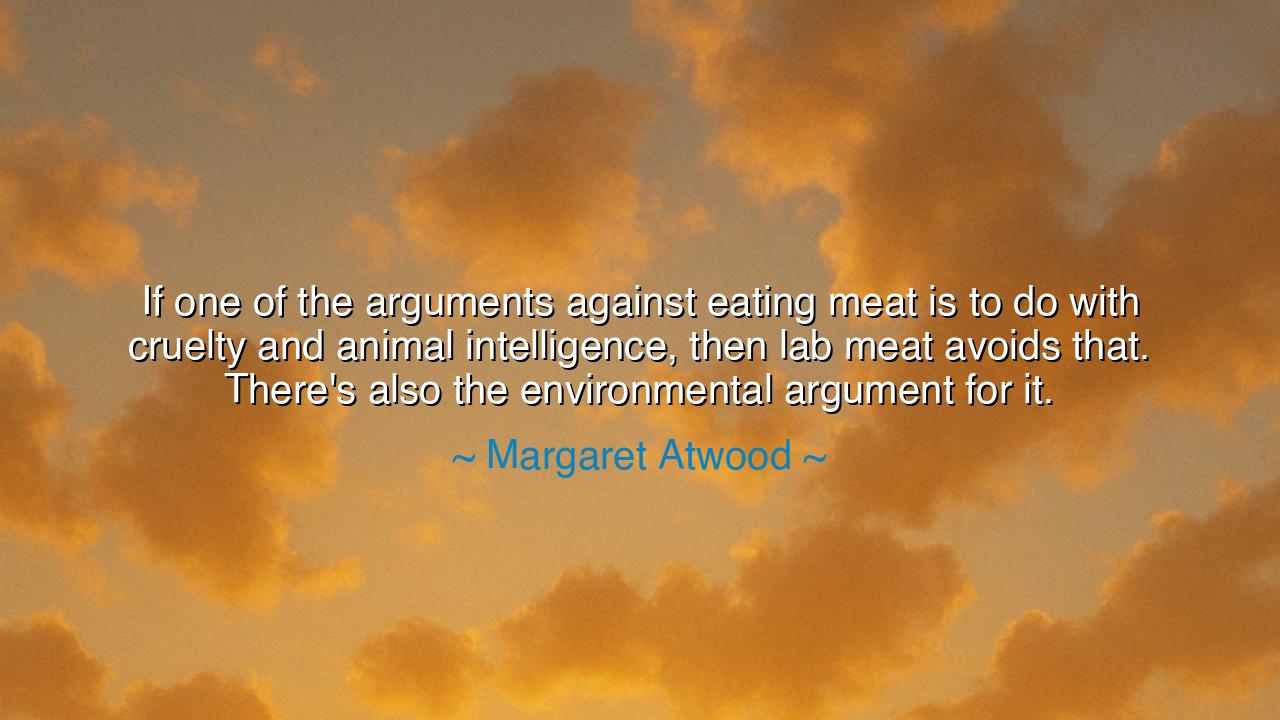
If one of the arguments against eating meat is to do with cruelty
If one of the arguments against eating meat is to do with cruelty and animal intelligence, then lab meat avoids that. There's also the environmental argument for it.






The visionary writer and moral philosopher Margaret Atwood, whose imagination often walks the border between prophecy and truth, once said: “If one of the arguments against eating meat is to do with cruelty and animal intelligence, then lab meat avoids that. There's also the environmental argument for it.” In these words, Atwood touches upon a question that has haunted the conscience of humankind since the dawn of civilization — how to nourish ourselves without destroying the world that sustains us. Her statement, though calm and rational on its surface, carries within it the quiet thunder of moral evolution. It is not merely about food; it is about compassion, intelligence, and the destiny of the human race in an age when invention and morality must finally walk hand in hand.
Atwood, ever the weaver of futures, speaks from her lifelong meditation on ethics and survival. In her novels — especially in works like Oryx and Crake — she envisioned worlds born of our own excess: societies where greed and technology run wild, and where humanity’s dominion over life turns monstrous. Yet, unlike the doomsayers who foresee only ruin, Atwood also sees redemption through ingenuity. Her mention of lab-grown meat, or cultured meat created without the slaughter of animals, is not the fantasy of fiction but the whisper of a coming transformation. For the first time in human history, we possess the power to feed ourselves without cruelty, and to correct, through science, the sins that nature has long suffered under our appetite.
The heart of her quote rests upon two great pillars — cruelty and environment. For centuries, humans have justified the killing of animals as necessity, as natural law. But as our awareness deepens, we can no longer ignore the intelligence, emotion, and suffering of the creatures we share the earth with. The argument against cruelty is no longer confined to the poets and mystics; it belongs also to the scientists who recognize consciousness in the eyes of the cow, the whale, the bird. If humanity’s intelligence is its greatest gift, then surely compassion is its highest form. To harm needlessly, when alternatives exist, is to betray both reason and empathy — the twin fires that define our species. Thus, lab meat, as Atwood suggests, becomes not only an innovation of science but an act of moral clarity.
Yet Atwood’s wisdom extends beyond compassion for animals. She points toward the environmental argument, a truth that even the ancient sages might have foreseen had they glimpsed our age of excess. The raising of livestock consumes forests, poisons rivers, and fills the air with the smoke of decay. The Earth, once vast and fertile, now groans beneath the weight of our hunger. The ancients spoke of balance — of giving back to the land what one takes — but modern humanity has forgotten that law. To cultivate meat in the lab is, in Atwood’s view, not to defy nature, but to honor it. It is to find a new harmony between progress and planet, between survival and sanctity.
Consider how every age has faced its own moral reckoning with food. In ancient times, the philosopher Pythagoras refused to eat flesh, believing that all souls were kin and that violence, even toward beasts, corrupted the spirit. Centuries later, thinkers such as Leonardo da Vinci and Tolstoy echoed this belief, recognizing that the cruelty we inflict on animals shapes the cruelty we tolerate among ourselves. Now, in our own time, we stand at another threshold — one where technology offers a path back to virtue. What once demanded blood can now be created without pain. The choice before us is not simply what to eat, but what kind of beings we wish to become.
Atwood’s tone, as always, is not dogmatic but hopeful. She does not condemn; she invites. Her vision is not of guilt, but of possibility — the belief that progress and morality can coexist. Her words remind us that intelligence alone is not enough; it must be guided by conscience. To invent a new world is one thing; to ensure that it is kinder than the old is another. Through lab-grown meat, humanity is being offered a chance to redeem its dominion — to prove that wisdom can triumph over habit, and compassion over convenience.
So let this be the lesson: do not fear progress when it serves mercy. Do not reject innovation simply because it challenges tradition. For the true measure of civilization is not in what it conquers, but in what it chooses to protect. The Earth has given us the tools to end suffering, to feed billions, and to heal the wounds of greed — if only we have the courage to use them. Laugh not at the idea of lab meat, but see in it the reflection of humanity’s higher purpose: to create without cruelty, to grow without destruction, to live without waste.
In the end, Atwood’s words are a call to the conscience of all future generations. Compassion, intelligence, and innovation — these are the sacred triad of the new age. If we are to survive not only as a species but as moral beings, we must learn to see our inventions not as replacements for nature, but as extensions of it. And when that balance is restored — when the flame of knowledge burns not for power but for peace — then humanity will have at last fulfilled the ancient prophecy of its own greatness: not the rule of the strong, but the rule of the wise.






AAdministratorAdministrator
Welcome, honored guests. Please leave a comment, we will respond soon